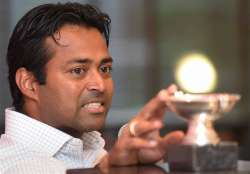I was more focused after Centennial Park bombing, says Leander Paes
New Delhi: Leander Paes, one of the 12 individual Olympic medal winners that India has produced in its sporting history, says that surviving the Centennial Park bombing during the 1996 Atlanta Games made him more

New Delhi: Leander Paes, one of the 12 individual Olympic medal winners that India has produced in its sporting history, says that surviving the Centennial Park bombing during the 1996 Atlanta Games made him more determined to win the coveted medal.
In a book – My Olympic Journey – co-authored by sports journalists Digvijay Singh Deo and Amit Bose, Paes has opened up about the harrowing time he went through that day when he struggled to re-enter the Games Village.
The 43-year-old legend, who is now set to appear in a record seventh Olympics in Rio, recalled that he had to literally beg before the security officials to get in.
“My parents, my team and I were all inside the park when it happened. We were about 30–40 feet away and we were rattled by the vibrations. Chairs and tables had fallen all around us, and my ears were ringing. I struggled with my hearing for the next twenty-four hours.”… when I reached the entrance to the Village, the gate had shut. I pleaded with the guards to let me in and showed them my credentials.
I told them my parents had gone home and public transport had been shut down. I had nowhere to go.
The poor guards were only following orders not to allow anyone in and they asked me to find another gate that might be open.
“I sprinted all the way to the next gate but got the same result. I kept running around for the next twenty minutes, going from one gate to the other, and it was probably at the fifth gate that I managed to literally beg the guard to let me in.
I told him I had been at the park when the bomb went off, and he was really humble and sweet, and had the presence of mind to let an Olympic athlete in.
“I slowly walked all the way back to my apartment block, gathering my thoughts and returning to the state of mind I had created for myself.
I was very lucky to make it through Centennial Park that day, and I know there is a God above who has always showered his blessings on me all my life.
“That incident made me more focused. I had a determination that went beyond what had propelled me when I just played for myself. I actually believed I could beat Andre Agassi in the semifinals.”
Paes had lost to the American legend in the semis but won the bronze medal play-off against Fernando Meligeni to be the first Indian since 1952 to win an individual Olympic medal.
“Every single day, I played with a purpose and things fell into place.”
Paes also showed his human side by spending a lot of time with Meligeni.
“I grew up a lot that day. I knew I was mentally tough, and that day was not about tennis, it was about the mind and the body. The first thing I did after winning was to run and give Fernando the longest possible hug as it was his dream that had been shattered.
“He was from Brazil, I was from India and we had few chances to win Olympic medals then. I knew the burden he would live with for the rest of his life. I spent a lot of time with him and his team.”
Paes said he further realised the magnitude of his achievement with the reactions of fellow athletes and fans.
“It took me around three days to get the medal off my neck. I shared it with the rest of the Indian contingent and was amazed at the euphoria a single medal can bring to an entire apartment block. Almost everyone came to congratulate me, and the biggest hugs came from my friends in the Indian hockey team.”
He has also shared the pain of missing out on a medal in 2008 Beijing Games, where the great Roger Federer won his first Olympic medal.